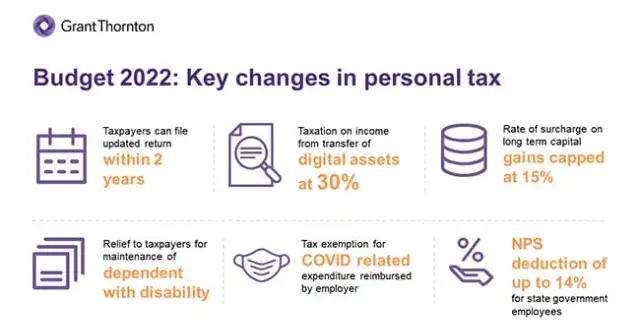Indian Economy
Budget 2022-23: Direct Taxes
- 03 Feb 2022
- 7 min read
For Prelims: Terms, Programs and Schemes related to Direct Tax, Changes made by the Government.
For Mains: Growth & Development, Planning, Government Budgeting, Inclusive Growth, Mobilisation of Resources, Government Policies & Interventions, Significance of Direct Taxes.
Why in News
Recently, the Finance Minister presented the Union Budget 2022-23 in Parliament.
- The proposals relating to taxes and duties aim to simplify the tax system, promote voluntary compliance by taxpayers, and reduce litigation. No changes have been proposed to the income tax slabs and tax rates (individual taxpayers).
- A direct tax is a tax that a person or organisation pays directly to the entity that imposed it. Example: income tax, real property tax, personal property tax, or taxes on assets.
What is there for Individuals?
- Updated Return:
- The government has proposed to provide a one-time window to correct omissions in Income Tax Returns (ITRs) filed.
- Taxpayers can file the updated returns within two years from the assessment years.
- Tax relief to persons with disability:
- The government proposed to allow the payment of annuity and lump sum amount to the differently abled dependent during the lifetime of parents/guardians, i.e., on parents/ guardians attaining the age of sixty years.
- The present law provides for deduction to the parent or guardian only if the lump sum payment or annuity is available to the differently abled person on the death of the subscriber i.e. parent or guardian.
- Parity between employees of State and Central government:
- Tax deduction limit increased from 10%to 14% on employer’s contribution to the
- National Pension System account of State Government employees which brings them at par with central government employees.
- It would help in enhancing social security benefits.
What is there for Corporates Businesses & Co-operatives?
- Reduced Alternate minimum tax rate and Surcharge for Cooperatives:
- To provide a level playing field between co-operative societies and companies, the government proposed to reduce this rate for the cooperative societies also to 15%.
- Proposed to reduce the surcharge on co-operative societies from present 12% to 7% for those having total income of more than 1 crore and up to 10 crores.
- This would help in enhancing the income of cooperative societies and its members who are mostly from rural and farming communities.
- Incentives for Start-ups:
- Earlier, the eligible start-ups established before March 2022 had been provided a tax incentive for three consecutive years out of ten years from incorporation.
- In view of the Covid pandemic, the government will extend the period of incorporation of the eligible start-up by one more year, that is, up to March 2023 for providing such tax incentive.
What about the Virtual Digital Assets?
- Scheme for taxation of virtual digital assets:
- Specific tax regime for virtual digital assets introduced. Any income from transfer of any virtual digital asset to be taxed at the rate of 30%.
- No deduction in respect of any expenditure or allowance to be allowed while computing such income except cost of acquisition.
- Loss from transfer of virtual digital assets cannot be set off against any other income.
- To capture the transaction details, Tax Deduction at Source (TDS) to be provided on payment made in relation to transfer of virtual digital assets at the rate of 1% of such consideration above a monetary threshold.
- Gift of virtual digital assets also to be taxed in the hands of the recipient.
What is there to make Taxation Simpler?
- Litigation Management:
- In cases where the question of law is identical to the one pending in the High Court or Supreme Court, the filing of appeal by the department shall be deferred till such question of law is decided by the court.
- To greatly help in reducing repeated litigation between taxpayers and the department.
- Deterrence against tax-evasion:
- No set off of any loss to be allowed against undisclosed income detected during search and survey operations.
- Tax incentives to International Financial Services Centres (IFSC):
- Subject to specified conditions, the following to be exempt from tax:
- Income of a non-resident from offshore derivative instruments.
- Income from over the counter derivatives issued by an offshore banking unit.
- Income from royalty and interest on account of lease of ship.
- Income received from portfolio management services in IFSC.
- Subject to specified conditions, the following to be exempt from tax:
What has the Government done for Tax Rationalisation?
- Rationalising TDS Provisions:
- Benefits passed on to agents as a business promotion strategy taxable in the hands of agents.
- Tax deduction provided to the person giving benefits, if the aggregate value of such benefits exceeds Rs 20,000 during the financial year.
- Rationalisation of Surcharge:
- Surcharge on AOPs (consortium formed to execute a contract) capped at 15% .
- Done to reduce the disparity in surcharge between individual companies and AOPs.
- Surcharge on long term capital gains arising on transfer of any type of assets capped at 15%.
- To give a boost to the start up community.
- Surcharge on AOPs (consortium formed to execute a contract) capped at 15% .





